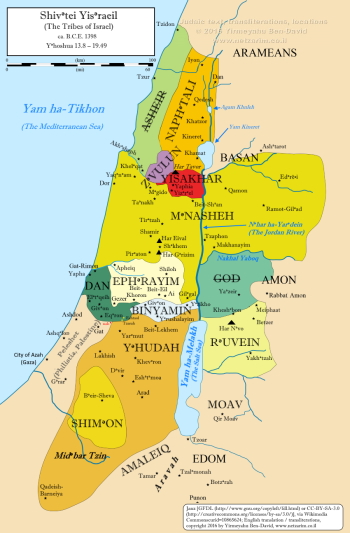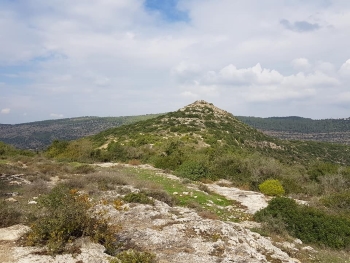
 |

 |
Following the death of the 12th Shō•pheitꞋ, Bᵊn•eiꞋ-Yi•sᵊrâ•eilꞋ recidivated yet again, acculturating![]() to the surrounding goy•imꞋ, doing wrong in the Eyes
to the surrounding goy•imꞋ, doing wrong in the Eyes![]() of é‑‑ä. So é‑‑ä allowed them to fall under the hand
of é‑‑ä. So é‑‑ä allowed them to fall under the hand![]() of the Greek colony of Pᵊli•shᵊt•inꞋ.
of the Greek colony of Pᵊli•shᵊt•inꞋ.
The Pᵊli•shᵊt•inꞋ had been ruling over Bᵊn•eiꞋ-Yi•sᵊrâ•eilꞋ for 40 years when a wonderful event happened to the unnamed![]() barren ish•âhꞋ of a man named Mâ•nōꞋakh, from the village of Tzâ•rᵊâhꞋ
barren ish•âhꞋ of a man named Mâ•nōꞋakh, from the village of Tzâ•rᵊâhꞋ![]() in the Tribal Region of Dân.
in the Tribal Region of Dân.
 |
One day, his ish•âhꞋ, who was barren, encountered a ma•lâkhꞋ![]() é‑‑ä, who would change their lives.
é‑‑ä, who would change their lives.
“You're going to conceive and give birth to a son,” the ma•lâkhꞋ![]() é‑‑ä predicted to her. “It's imperative that you drink no wine nor alcoholic beverage; nor eat any tâ•reiphꞋ substance during your pregnancy. From birth, the boy is to be a lifelong nâ•zirꞋ to ël•ōh•imꞋ. His hair and beard must never be cut nor shaved, and he must never drink wine nor other intoxicating beverage, nor ever eat anything not kâ•sheirꞋ. It is he who will kick-start the national military-salvation of Yi•sᵊr•â•eilꞋ out from under the hand
é‑‑ä predicted to her. “It's imperative that you drink no wine nor alcoholic beverage; nor eat any tâ•reiphꞋ substance during your pregnancy. From birth, the boy is to be a lifelong nâ•zirꞋ to ël•ōh•imꞋ. His hair and beard must never be cut nor shaved, and he must never drink wine nor other intoxicating beverage, nor ever eat anything not kâ•sheirꞋ. It is he who will kick-start the national military-salvation of Yi•sᵊr•â•eilꞋ out from under the hand![]() of the Greek colony of Pᵊli•shᵊt•inꞋ.”
of the Greek colony of Pᵊli•shᵊt•inꞋ.”
The ma•lâkhꞋ![]() ha-ël•ōh•imꞋ hadn't introduced himself by name.
So the ish•âhꞋ told her husband, Mâ•nōꞋakh, "An ish ha-ël•ōh•imꞋ came to me. His appearance
ha-ël•ōh•imꞋ hadn't introduced himself by name.
So the ish•âhꞋ told her husband, Mâ•nōꞋakh, "An ish ha-ël•ōh•imꞋ came to me. His appearance![]() appeared to be a ma•lâkhꞋ
appeared to be a ma•lâkhꞋ![]() é‑‑ä; quite impressive. I didn't ask his name or from where he came."
é‑‑ä; quite impressive. I didn't ask his name or from where he came."
Then Mân•ōꞋakh appealed to é‑‑ä pleading, "A•dōn•âiꞋ, please, may the ish ha-ël•ōh•imꞋ whom You sent come again and teach us the details of how we should raise our future son."
Ël•ōh•imꞋ hearkened to Mân•ōꞋakh, and the ma•lâkhꞋ![]() ha-ël•ōh•imꞋ came to her again as she sat in the field. But, again, Mân•ōꞋakh, missed him. This time, though, she ran and told her husband, "Look, hâ-ish who came to me the other day has appeared." So Mân•ōꞋakh got up and followed his ish•âhꞋ. Approaching hâ-ish, Mân•ōꞋakh asked him, "Are you hâ-ish who spoke with my ish•âhꞋ?"
ha-ël•ōh•imꞋ came to her again as she sat in the field. But, again, Mân•ōꞋakh, missed him. This time, though, she ran and told her husband, "Look, hâ-ish who came to me the other day has appeared." So Mân•ōꞋakh got up and followed his ish•âhꞋ. Approaching hâ-ish, Mân•ōꞋakh asked him, "Are you hâ-ish who spoke with my ish•âhꞋ?"
"I am," he replied.
"Ok," Mân•ōꞋakh acknowledged, "when your dᵊvarꞋ is realized, what should be the mi•shᵊpâtꞋ for the young man? What should be his ma•a•sëhꞋ?"
"The ish•âhꞋ must watchguard everything that I told her," the ma•lâkhꞋ![]() é‑‑ä replied. "She may eat no product of the wine-vine; neither wine nor any intoxicating beverage. Nor may she eat any non-kâ•sheirꞋ substance. She must watchguard everything that I commanded her."
é‑‑ä replied. "She may eat no product of the wine-vine; neither wine nor any intoxicating beverage. Nor may she eat any non-kâ•sheirꞋ substance. She must watchguard everything that I commanded her."
Then Mân•ōꞋakh pleaded to the ma•lâkhꞋ![]() é‑‑ä, "Please, we insist you stay for dinner. We'll put a goat-kid on the spit for you."
é‑‑ä, "Please, we insist you stay for dinner. We'll put a goat-kid on the spit for you."
But the ma•lâkhꞋ![]() é‑‑ä answered, "Even if you detain me to stay, I won't eat your lëkhꞋëm.
é‑‑ä answered, "Even if you detain me to stay, I won't eat your lëkhꞋëm.![]() If you grill-sacrifice a kid, you may only do so for é‑‑ä!"
If you grill-sacrifice a kid, you may only do so for é‑‑ä!"
"What is your name," Mân•ōꞋakh asked the ma•lâkhꞋ![]() é‑‑ä, "so that we can give you proper credit when your prediction comes true?"
é‑‑ä, "so that we can give you proper credit when your prediction comes true?"
"Why do you ask my name," replied the ma•lâkhꞋ![]() é‑‑ä, "but, since you asked, it's ôÆìÄàé."
é‑‑ä, "but, since you asked, it's ôÆìÄàé."
 |
So, standing on a boulder, Mân•ōꞋakh took the kid with its mi•nᵊkh•âhꞋ for é‑‑ä; and the ma•lâkhꞋ![]() offered
offered![]() it wonderfully as Mân•ōꞋakh and his ish•âhꞋ watched.
it wonderfully as Mân•ōꞋakh and his ish•âhꞋ watched.
After dinner, heads bowed toward the ground reciting a simple Bi•rᵊk•atꞋ ha-Mâ•zōnꞋ, ![]() é‑‑ä returned back up into the mountains – as he had said he would.
é‑‑ä returned back up into the mountains – as he had said he would.
The ma•lâkhꞋ![]() é‑‑ä never appeared to Mân•ōꞋakh or his ish•âhꞋ again. But from that experience, Mân•ōꞋakh realized that the man
é‑‑ä never appeared to Mân•ōꞋakh or his ish•âhꞋ again. But from that experience, Mân•ōꞋakh realized that the man![]() was a ma•lâkhꞋ
was a ma•lâkhꞋ![]() é‑‑ä
é‑‑ä

Optional parental preparation:
13.01, hand – I.e. rule. We learn from this metaphor that the Ta•na"khꞋ prohibition against anthropomorphism forces the deduction that, similarly, "the éÈã of é‑‑ä" can only be a metaphor; i.e. "the Rule of é‑‑ä", not the literal Arm/Hand seen in idolatrous Christian paintings, etc., perpetuating their metamorphosis of Roman Hellenist (Ζεύς) idolatry into post-135 C.E. Roman Hellenist Christianity.![]()
What does "conceive" mean?
13.02 – öÌÈøÀòÈä (Tzâ•rᵊâhꞋ) – name of village in Dân Tribal Region located ≈1½ km (1 mi) NW of Beit-ShëmꞋësh (house of the sun). Linguistically related to öÈøÇòÇú (tzâ•raꞋat; epilepsy – demonstrated by Rabbi Hirsch and others that it was not leprosy). ![]()
13.03, Ma•lâkhꞋ é‑‑ä, (13.3) who was a Ma•lâkhꞋ ël•ōh•imꞋ (13.6) – is an àÄéùÑ (13.6, 8)!!!![]()
I.e. dressed in priestly garb, perhaps long hair of a nâ•zirꞋ. Notice that Mâ•nōꞋakh has no impression from his ish•âhꞋ of any supernatural "angel" or any other anthropomorphism (which Tōr•âhꞋ prohibits). He explicitly repeats identically her usage of the phrase "ish ha-ël•ōh•imꞋ", an adult male human being. Even though he later questions whether their dinner with the ish (v.22) was a – fatal – occasion of "seeing ël•ōoh•imꞋ", his ish•âhꞋ assured him that was not the case. ![]()
13.16, Why, even if hâ-ish/ish ha-ël•ōh•imꞋ/ma•lâkhꞋ![]() ha-ël•ōh•imꞋ/ma•lâkhꞋ
ha-ël•ōh•imꞋ/ma•lâkhꞋ![]() é‑‑ä were persuaded to stay, did he, apparently unnecessarily and rudely, declare that he would refuse to eat Mân•ōꞋakh's lëkhꞋëm? –
é‑‑ä were persuaded to stay, did he, apparently unnecessarily and rudely, declare that he would refuse to eat Mân•ōꞋakh's lëkhꞋëm? –
First, the text describes a human man who is a ma•lâkhꞋ![]() – an emissary or spokesperson – of é‑‑ä. Dark Ages superstitious and anthropomorphic idolatry and supernaturalism aside, this man was a kō•heinꞋ (or the non-kō•heinꞋ equivalent – a nâ•zirꞋ).
– an emissary or spokesperson – of é‑‑ä. Dark Ages superstitious and anthropomorphic idolatry and supernaturalism aside, this man was a kō•heinꞋ (or the non-kō•heinꞋ equivalent – a nâ•zirꞋ).
As a nâ•zirꞋ, the man was obligated to undertake many of the obligations of a kō•heinꞋ.
After 40 years of apostasy under the hand of the Greek colony of Pᵊli•shᵊt•inꞋ, attention to Tōr•âhꞋ had likely become lax in much of the Israeli population. Hence, there was a need for nᵊzir•imꞋ to reeducate Israelis to tᵊshuv•âhꞋ Tōr•âhꞋ.
One of the obligations of a kō•heinꞋ was to accept, and eat only, the Tᵊrūm•ōtꞋ![]() of everyone's lëkhꞋëm.
of everyone's lëkhꞋëm.
LëkhꞋëm from which the Tᵊrūm•ōtꞋ had not been taken was tâ•reiphꞋ.
Similarly, lëkhꞋëm other than the Tᵊrūm•ōtꞋ wasn't kâ•sheirꞋ for a kō•heinꞋ – or a nâ•zirꞋ.
Ergo, only the Tᵊrūm•ōtꞋ (which wasn't Mân•ōꞋakh's lëkhꞋëm) was kâ•sheirꞋ for the ma•lâkhꞋ![]() . The ma•lâkhꞋ
. The ma•lâkhꞋ![]() couldn't eat Mân•ōꞋakh's lëkhꞋëm. His working knowledge of this law also suggests this man was a kō•heinꞋ – or a nâ•zirꞋ.
couldn't eat Mân•ōꞋakh's lëkhꞋëm. His working knowledge of this law also suggests this man was a kō•heinꞋ – or a nâ•zirꞋ.
The text describes ma•lâkhꞋ![]() performing the sacrifice, which he ruled could only be offered to é‑‑ä, "wonderfully"! This clearly implies that the ma•lâkhꞋ
performing the sacrifice, which he ruled could only be offered to é‑‑ä, "wonderfully"! This clearly implies that the ma•lâkhꞋ![]() had to be either a kō•heinꞋ or a nâ•zirꞋ.
had to be either a kō•heinꞋ or a nâ•zirꞋ.
Since he was prepping the parents to raise a nâ•zirꞋ, it seems likely that the ma•lâkhꞋ![]() was raising up another like himself; in which case, the ma•lâkhꞋ
was raising up another like himself; in which case, the ma•lâkhꞋ![]() was, himself, probably a nâ•zirꞋ.
was, himself, probably a nâ•zirꞋ.![]()
Questions you might anticipate that your child might raise and be prepared to discuss:
What does "barren" mean?
What does "foretell" mean?
What does the verb "monitor" mean? What is a monitor?
What is a "coast"?
What does "predict" mean?
What's an "alcoholic beverage"?
What does "kick-start" mean? (derived from starting a motorcycle)
What's "superstitious"?
![]()
 |
 |